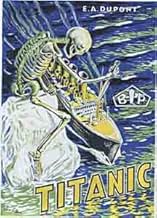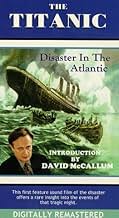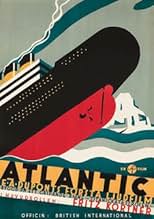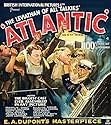Adicionar um enredo no seu idiomaOn its maiden voyage in April 1912, the supposedly unsinkable RMS Titanic hits an iceberg in the Atlantic Ocean.On its maiden voyage in April 1912, the supposedly unsinkable RMS Titanic hits an iceberg in the Atlantic Ocean.On its maiden voyage in April 1912, the supposedly unsinkable RMS Titanic hits an iceberg in the Atlantic Ocean.
- Direção
- Roteiristas
- Artistas
Gordon James
- Capt. Collins
- (as Sydney Lynn)
- Direção
- Roteiristas
- Elenco e equipe completos
- Produção, bilheteria e muito mais no IMDbPro
Avaliações em destaque
How interesting that E.A. Dupont who created one of germany's most memorable silent films (VARIETY) also helmed one of England's first talkies. Obviously he was uneasy with the medium of talking pictures, note how the first 6 minutes of this film is entirely visual. Most of the cast had stage experience, you can tell because they over-exaggerate their lines and cannon out the words like they were playing to the back row. Still this is a well paced dramatic film and the final few minutes have an impact that can stand on their own alongside the later versions, TITANIC and A NIGHT TO REMEMBER. (I am deliberately excluding James Cameron's film with its budget that would have fed a 3rd World country for 10 years and its plethora of computer FX.)
I purchased this film on DVD to add to my collection of Madeleine Carroll films, and although the stunningly beautiful actress does not have a tremendous amount of screen time, I was not disappointed in the final product. I've never particularly cared for disaster films, and the Cameron blockbuster of a few years ago left me decidedly cold, as it were. Not being an expert on the events surrounding the sinking, I was still quite sure that this mega-hit had little relation to what actually transpired on that fateful night. In any event, I am convinced that the film under review is of greater historical accuracy, and unlike the other reviewers, I am not particularly discouraged to discover that a film made almost 80 years ago is not quite as "spiffy" as more recent products. At the very least, films of this type should be regarded as valuable documents of the ways things were done in the not too distant past, and when you realize that "Atlantic" was made a mere 17 years after the Titanic went down, that is all the more reason to cherish it as an invaluable time capsule of a significant event in the annals of the 20th century that still apparently fascinates a great many people.
As far as the individual performances are concerned, I thought that the players effectively conveyed the starkness of the dilemma the doomed passengers were facing, especially the futility of those remaining men who had hope no hope of salvation, the end being only a matter time. Of particular note was the abrupt contrast between the gay frivolity that permeated the mood immediately before the bad news was conveyed by Lanchester and what immediately followed. Add to that Monica's frantic separation from her husband, as she was literally dragged on to the hanging lifeboat, was quite poignant, made all the more so when the news that she was pregnant became known later.
For those interested in a well made vintage film that provides a fascinating look at a sensational event with which practically everyone alive has at least some inkling of, I highly recommend this film. (And there's the added bonus of a very young Madeleine Carroll to feast your eyes on).
As far as the individual performances are concerned, I thought that the players effectively conveyed the starkness of the dilemma the doomed passengers were facing, especially the futility of those remaining men who had hope no hope of salvation, the end being only a matter time. Of particular note was the abrupt contrast between the gay frivolity that permeated the mood immediately before the bad news was conveyed by Lanchester and what immediately followed. Add to that Monica's frantic separation from her husband, as she was literally dragged on to the hanging lifeboat, was quite poignant, made all the more so when the news that she was pregnant became known later.
For those interested in a well made vintage film that provides a fascinating look at a sensational event with which practically everyone alive has at least some inkling of, I highly recommend this film. (And there's the added bonus of a very young Madeleine Carroll to feast your eyes on).
Yes I know "talkies" had just been invented for the cinema 2 years earlier when this was produced in 1929 but this film showed that much had to learnt about the art of producing films.It comes over as a filmed "hammy" stage play with the actors melodramatically enunciating their lines,rolling their eyes, using too many pregnant pauses and using gestures more appropriate to silent cinema, which I suppose was normal during the process of educating them to appear more naturalistic on screen.The gaps between lines spoken should have been tightened up during editing as it considerably slows the film.It is now only of interest for Titanic buffs who want to see an early example of this marine accident on film.In next chronological order they could see "Titanic" (1953) A Night to Remember (1958)"Titanic (1997), to see how the cinema's depiction of this tragedy as evolved over the years.There have been many documentaries and TV films made including the atrocious "SOS Titanic" (1979) On my version which is a DVD, David McCallum gives the introduction.It was he who played Harold Bride Marconi's junior wireless operator in "A Night to Remember"(still the best feature film - please read my "Tribute to Walter" comments on IMDb under Howard Morley.demon.co.uk)and gave the commentary on the series of 4 videos entitled "End of a Dream" so he was well qualified to give the narration.Of more interest I found was a recording accompanied by actual photos of the 1912 US Senate hearing which is also on the DVD.Actors speak the actual words spoken by Lightoller 2nd officer, J Bruce Ismay,Managing director of White Star, Harold Bride and others including Gloria Stewart (The "old Rose" in Titanic 1997) whose voice is used for one of the first class women survivors.
Try to focus on the actual disaster, having just occurred sixteen, seventeen years earlier than when this film came out, and see what was known, what was rumored, what was accepted to have happened, and not dwell on the rawness of the film-making.
Well, that was near impossible to do, right up to the end. I thought Alfred Hitchcock's "Murder" (which came out about the same time) was about one of the most experimental films I had ever seen, but I think this one might outdo it.
The sound is awful, but a silent film done well, or a totally non-talking piece, such as what Laurel & Hardy did, could be just as entertaining, if it has a good story structure. Well, this movie can't claim that either.
Hands down, that mother constantly weeping about her nerves and pressing the hankie to her mouth because she has learned her husband was cheating on her was a constant irritation. Oh, if only she had gone down with the ship!
As with the Barbara Stanwyck-Clifton Webb-Robert Wagner 1953 version, this film delved into adultery. No idea why that theme was always attached to the sinking.
Franklin Dyall, father of the impressive Valentine Dyall (best known for Doctor Who appearances to the American audience) strived for his best Lionel Barrymore, but was outdone in two seconds by Elaine Terriss as his wife, in her brief appearance when she learned he wouldn't enter a lifeboat.
Even to a novice like me, there clearly was a problem with direction; with how sound on the film would sound as opposed to dialogue delivered on stage, as well as to how it was recorded.
I was dumbstruck by Dyall questioning Manchester "you seem to think this is damn serious?"
Wasn't it a really big deal when Clark Gable said 'Damn' in "Gone With the Wind"?
Oh, he was a MAJOR star. A major star doing that. I see.
And I look at most depictions of Blacks in these old films as being historical, but to put a pair of Blacks on this thing just to have them shot because they try to storm the lifeboats I'm sure didn't help race relations back then. While these were actual Black people and not blackface, I tend to try to think how much the performers enjoyed working and getting to dive off the boat like that.
Other than the 1912 version with actual Titanic survivor Dorothy Gibson in it, wearing the outfit she was wearing when she was rescued, this stands as about the earliest version of the disaster. No idea what that Italian 1915 film could be, if it is even based on the ship-in-question.
This film was to be titled Titanic, but outrage and sensitivity toward the event, which again, had just occurred sixteen years earlier, saw a retitling, and it became "Atlantic".
The version I have on tape has a reworked title with the old stock footage of the doomed liner and it is now titled "Titanic". As a film, I would have preferred the original title to be present.
As it is, scenes of the film's disaster, and for that matter still shots I have seen from this movie, did not match up to what was present here, so I'm not sure what is going on as far as editing goes.
There are other Titanic movies depicting the ship to check out, but if you are a buff, like me, you enjoy checking out as many different versions of the Titanic that you can find.
Of all I have seen now (S.O.S. Titanic, 1943 German version, Cameron's Titanic, Night To Remember, George C. Scott-Catherine Zeta Jones, 1953, Unsinkable Molly Brown, even have the recent musical soundtrack), this one has to be the worst.
Well, that was near impossible to do, right up to the end. I thought Alfred Hitchcock's "Murder" (which came out about the same time) was about one of the most experimental films I had ever seen, but I think this one might outdo it.
The sound is awful, but a silent film done well, or a totally non-talking piece, such as what Laurel & Hardy did, could be just as entertaining, if it has a good story structure. Well, this movie can't claim that either.
Hands down, that mother constantly weeping about her nerves and pressing the hankie to her mouth because she has learned her husband was cheating on her was a constant irritation. Oh, if only she had gone down with the ship!
As with the Barbara Stanwyck-Clifton Webb-Robert Wagner 1953 version, this film delved into adultery. No idea why that theme was always attached to the sinking.
Franklin Dyall, father of the impressive Valentine Dyall (best known for Doctor Who appearances to the American audience) strived for his best Lionel Barrymore, but was outdone in two seconds by Elaine Terriss as his wife, in her brief appearance when she learned he wouldn't enter a lifeboat.
Even to a novice like me, there clearly was a problem with direction; with how sound on the film would sound as opposed to dialogue delivered on stage, as well as to how it was recorded.
I was dumbstruck by Dyall questioning Manchester "you seem to think this is damn serious?"
Wasn't it a really big deal when Clark Gable said 'Damn' in "Gone With the Wind"?
Oh, he was a MAJOR star. A major star doing that. I see.
And I look at most depictions of Blacks in these old films as being historical, but to put a pair of Blacks on this thing just to have them shot because they try to storm the lifeboats I'm sure didn't help race relations back then. While these were actual Black people and not blackface, I tend to try to think how much the performers enjoyed working and getting to dive off the boat like that.
Other than the 1912 version with actual Titanic survivor Dorothy Gibson in it, wearing the outfit she was wearing when she was rescued, this stands as about the earliest version of the disaster. No idea what that Italian 1915 film could be, if it is even based on the ship-in-question.
This film was to be titled Titanic, but outrage and sensitivity toward the event, which again, had just occurred sixteen years earlier, saw a retitling, and it became "Atlantic".
The version I have on tape has a reworked title with the old stock footage of the doomed liner and it is now titled "Titanic". As a film, I would have preferred the original title to be present.
As it is, scenes of the film's disaster, and for that matter still shots I have seen from this movie, did not match up to what was present here, so I'm not sure what is going on as far as editing goes.
There are other Titanic movies depicting the ship to check out, but if you are a buff, like me, you enjoy checking out as many different versions of the Titanic that you can find.
Of all I have seen now (S.O.S. Titanic, 1943 German version, Cameron's Titanic, Night To Remember, George C. Scott-Catherine Zeta Jones, 1953, Unsinkable Molly Brown, even have the recent musical soundtrack), this one has to be the worst.
For some reason this 1929 film was titled Atlantic when it could have easily been titled Titanic, or something with "Titanic" in its title (however it has been released on video as Titanic.) I suppose they might have titled it Atlantic due to fictional characters and stories that didn't really happen on The Titanic and its fateful voyage, but the story of the film is clearly the disaster that happened to The Titanic. The ship in the film is crossing The Atlantic, and enters areas known to have icebergs. Many of the characters introduced are wealthy types, and we know there were very rich and prominent passengers on The Titanic. Some of the characters include: A husband and father, who cheats on his wife during the voyage; his wife, who tearfully knows her husband was with another woman; their daughter, who outspokenly resents her father for cheating on her mother; a recently wed couple with child on the way; a wheelchair bound gentleman who seems to become the wisdom during the crisis; his wife, who will not leave his side when it's "women and children first;" and a man who seems to drink heavily even before the disaster happens. During the voyage the ship strikes an iceberg, and begins to sink. Lifeboats are being filled with women and children as the ship sends S.O.S. Pandemonium breaks out with many passengers, but our main characters seem to fall into a sad calmness. There is a gathering of many passengers in a lounge, and they drink or play cards to pass the time while waiting to die. On another part of the ship, people are huddled together and singing, "Nearer My God To Thee." Soon all goes black and we know the ship has gone down. This is where the film ends, and there are no scenes of the lifeboats after the sinking. Nor are we shown any scenes of surviving characters, or a rescue ship. Obviously many facts of what happened on The Titanic are correctly portrayed, but other events in Atlantic are either incorrect to The Titanic's disaster, or added as fiction. Atlantic was released by British International Pictures, and the quality of this feature is fine. The film has its typical (of the era) share of crudeness (grainy, jumping, lighting, editing), and there are several instances where it seems like a silent film. There are a couple instances where cheerful music seems very inappropriate to situations going on in the film, (I don't mean when the band begins to play as passengers are being put in lifeboats; this inappropriate music is before the ship strikes the iceberg.) There are a few instances of continuity errors in Atlantic. Atlantic does not attempt much in the way of special effects, but what is attempted is nicely done. The sinking of the ship is not shown, but is indicated when the screen goes black one final time. Having the film end right at the sinking creates a feeling of incompleteness, and it seems the story should have had a more meaningful conclusion. The acting in Atlantic is fair to good, and the film as a whole is fair to good. I found the film to be more thought-provoking than exciting, and it is an interesting disaster effort.
Você sabia?
- CuriosidadesThe White Star Line forbade the production company from referring to the ship in this film as The Titanic.
- Erros de gravaçãoSet in 1912, he women's hairstyle and dresses are from 1929.
- Versões alternativasReleased with separate English, French and German soundtracks.
- Trilhas sonorasWalking With Susie
(uncredited)
Written by G.H. Elliott
Played by the ship's band as Larry and Monica enter the Smoking Room.
Principais escolhas
Faça login para avaliar e ver a lista de recomendações personalizadas
Detalhes
- Data de lançamento
- País de origem
- Idioma
- Também conhecido como
- Titanic: Disaster in the Atlantic
- Locações de filme
- Empresa de produção
- Consulte mais créditos da empresa na IMDbPro
Bilheteria
- Orçamento
- £ 2.000 (estimativa)
- Tempo de duração
- 1 h 30 min(90 min)
- Cor
- Proporção
- 1.20 : 1
Contribua para esta página
Sugerir uma alteração ou adicionar conteúdo ausente























